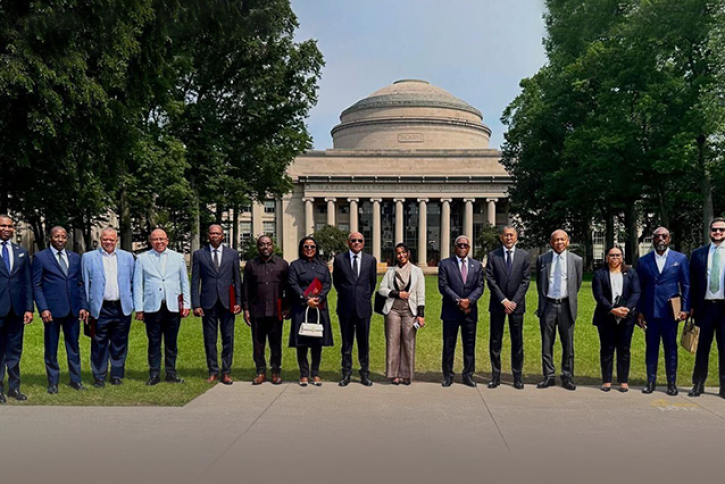
Stakeholders from MIT-Africa, Sonangol, and Instituto Superior Politécnico de Tecnologias e Ciências (ISPTEC).
The MIT Center for International Studies is delighted to announce the launch of a new pilot initiative with Angola, to be implemented through its MIT-Africa Program.
The new initiative marks a significant collaboration between MIT-Africa, Sonangol (Angola’s national energy company), and the Instituto Superior Politécnico de Tecnologias e Ciências (ISPTEC). The partnership was formalized at a signing ceremony on MIT’s campus on Friday, June 13, with key stakeholders from all three institutions present, including Dr. Diamantino Pedro Azevedo, the Angolan Minister of Mineral Resources, Petroleum, and Gas and Sonangol CEO Mr. Gaspar Martins.
“This partnership marks a pivotal step in the Angolan government's commitment to leveraging knowledge as the cornerstone of the country’s economic transformation,” says Minister Azevedo. “By connecting the oil and gas sector with science, innovation, and world-class training, we are equipping future generations to lead Angola into a more technological, sustainable, and globally competitive era.”
The sentiment is shared by the MIT-Africa Program leaders. “This initiative reflects MIT’s deep commitment to fostering meaningful, long-term relationships across the African continent,” said Mai Hassan, faculty director of the MIT-Africa Program. “It supports our mission of advancing knowledge and educating students in ways that are globally informed, and it provides a platform for mutual learning. By working with Angolan partners, we gain new perspectives and opportunities for innovation that benefit both MIT and our collaborators.”
In addition to its new collaboration with MIT-Africa, Sonangol has joined MIT’s Industrial Liaison Program (ILP), breaking new ground as its first corporate member based in Sub-Saharan Africa. ILP enables companies worldwide to harness MIT resources to address current challenges and to anticipate future needs. As an ILP member, Sonangol seeks to facilitate collaboration in key sectors such as natural resources and mining, energy, construction, and infrastructure.
The MIT-Africa Program manages a portfolio of research, teaching, and learning initiatives that emphasize two-way value—offering impactful experiences to MIT students and faculty while collaborating closely with institutions and communities across Africa. The new Angola partnership is aligned with this ethos and will launch with two core activities during the upcoming academic year:
- Global Classroom – An MIT course on geo-spatial technologies for environmental monitoring, taught by an MIT faculty member, will be brought directly to the ISPTEC campus, offering Angolan students and MIT participants a collaborative, in-country learning experience.
- Global Teaching Labs – MIT students will travel to ISPTEC to teach STE(A)M subjects on renewable energy technologies, engaging Angolan students through hands-on instruction.
“This is not a traditional development project,” said Ari Jacobovits, managing director of MIT-Africa. “This is about building genuine partnerships rooted in academic rigor, innovation, and shared curiosity. The collaboration has been designed from the ground up with our partners at ISPTEC and Sonangol. We’re coming in with a readiness to learn as much as we teach.”
The pilot marks an important first step in establishing a long-term partnership with Angola. By investing in collaborative education and innovation, the new initiative aims to spark novel approaches to global challenges and strengthen academic institutions on both sides.
These agreements with MIT-Africa and ILP “not only enhance our innovation and technological capabilities, but also create opportunities for sustainable development and operational excellence,” says Mr. Gaspar. “They advance our mission to be a leading force in the African energy sector.”
“The vision behind this initiative is bold,” said Hassan. “It’s about co-creating knowledge and building capacity that lasts.”

